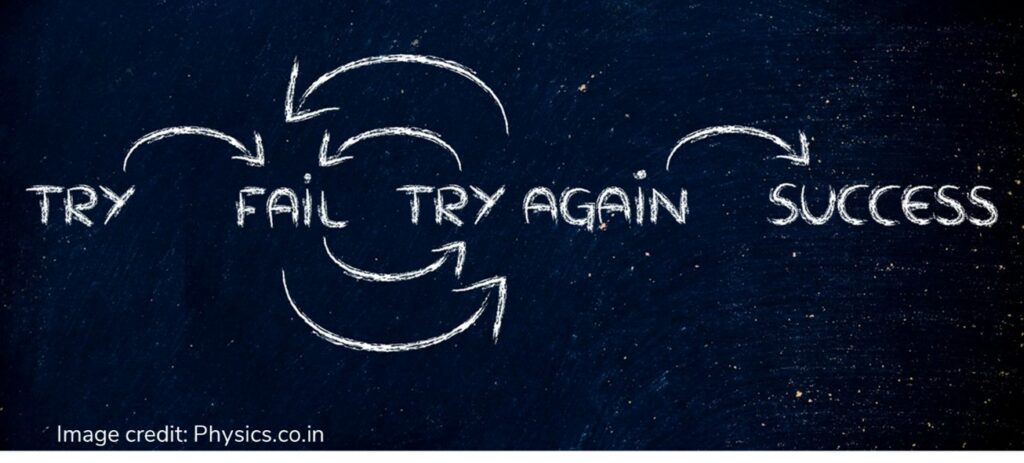Embrace failure… for that is the only path to success. Before succeeding in anything worthwhile, everyone fails. However, those who succeed, embrace failure and learn from it. While this article is focused on the GMAT Prep mistakes, the general principles are applicable to most things “worthwhile”.

In this article, I describe the 6 core areas where students fail during their GMAT preparation and list the attitude that high scorers demonstrate while tackling these failures. Go through it and see which of these failures are applicable to you.
Does everyone fail?
Yes, everyone but GMAT Savants fails. Now, whether they fail during the preparation process or on the real test depends on at what stage they embrace failure and address it head-on. But everyone fails: high scorers fail, weak students fail, Retakers fail and even those who get done with their GMAT journey in 30 days, fail. The big differences are – where they fail and how they process failure. Without failure, there is little success. In my experience, most “high scorers” face at least 10 mini failures and one major failure.
Ok, if everyone fails, then why don’t they talk about their GMAT prep mistakes in their debriefs? Why are those stories all about “I studied this resource or practiced the OG and everything was hunky dory.”
Because for these people, that very failure is the stepping stone to success. These failures are obvious to them, and hence they do not mention them. Why are they obvious – because most people who score high have gone through this journey of succeeding in something worthwhile multiple times.
So.. where do these people fail?
Here are six areas where people fail. Note, that I tried my best to organize them in a logical sequence – the sequence of your preparation.
- Number 1: Failure to devote time consistently to prep work – primary reasons, lack of planning, lack of communication, lack of realization of how much willpower it will take.
- Number 2: Failure to concentrate while studying – In the middle of an activity, students would switch over to watching a 5-minute Youtube Video, do a chore, or just leave the activity midway. This is a failure.
- Number 3: Failure during the cementing phase: After learning a subsection, say NP, Algebra, TPA, etc. When students practice questions, most of them fail to hit the required accuracies initially. However, those who succeed fail only momentarily before bouncing back, while others give up and move on to the next sub-section (amplifying their failure).
- Number 4: Failure to perform on mocks, despite doing well during cementing phase: Students who don’t believe in test readiness, or don’t do test readiness discover that their mock scores are lower (sometimes much lower) than their predicted scores based on their abilities.
- Number 5: Failure to improve from 90th to 95th /99th percentile: Students who do well in Cementing and Test readiness improve to the 90th percentile but remain stuck there; why because they fail to look at data and weed out their specific weaknesses.
- Number 6: Underperform on the actual test despite doing well on mocks: Three reasons for the same – 1) Nervousness, 2) lack of a rested mind before the test, 3) Bad luck, and 4) change of strategy before the exam
Observation: Uncorrected failures in earlier stages lead to much bigger failures overall and are much more challenging to correct, while failures in later stages are not as big, and are much easier to fix.
Start your GMAT journey with our free GMAT mock test to gauge your baseline score,
Some examples of students who failed
Let me reiterate – almost everyone fails! Even the most ideal students fail at least one point if not multiple. I have observed (by virtue of data) 780 scorers leave application files midway, only to comeback an hour later. Similarly, I have seen the smartest individuals (IIT ungrads, McKinsey analysts, etc.) do one mock after the other rather than figuring out why they are stuck. I have seen the most well-prepared students who claim to have aced 10s of exams spend the last few days trying to squeeze the last 10 points out, only to underperform in areas of their strength. Actually, I have been guilty of that last one as well. Here are a few more examples:
Sankha – a recent GFE 99th percentile scorer, failed on 8 out of ~60 cementing quizzes he took. In most of these cases, he failed first before succeeding. BTW – he failed on the GMAT three times before scoring 715.
Jim Yi (770, Booth graduate), failed on CR during his first attempt. He dug deep down to understand the cause of failure and addressed the same and improved to 770 within 20 days.
Aastha (730, Kellogg graduate), had to take 4 attempts to improve from 630 to 730. She failed 1) on multiple cementing quizzes (first attempt) 2) due to test readiness (second attempt) 3) to perform at her peak during (third attempt).
Nishant (740, Columbia graduate) failed on multiple fronts, starting from approaching the GMAT using tricks and shortcuts during his first attempt, under estimating the time needed during his second attempt, and because he did not use analytics to identify is shortcomings and improve from them during his third attempt.
So what separates those who ultimately succeed from those who don’t succeed
Four things separate those who ultimately succeed from those who don’t.
1) They identify failures early
First, successful students (we will call them high scorers) identify failures early. They explicitly tag this as a failure and are flexible enough to devote additional time and energy to it. On the other hand, students who don’t succeed, assume that things would fall in place by themselves. Let us take an example – a high-scorer who in the first 10 days, fails to devote time on 4 out of those 10 days, identifies the failure to study an issue, whereas, another student congratulates himself for that 60% achievement and hopes that things would get better (hint: they don’t)
2) They do causal analysis
Causal arguments are not only a part of GMAT CR but also a part of our daily lives. In one form or the other, high scorers, reason to identify the root causes of failures. They then put in time to ensure that they address those causes. These high scorers reach out for help when they don’t have a good answer to a particular problem. Remember, ultimate success, not ego, matters to them.
3) They build solutions
There are bandaids and there are sustainable solutions. High scorers, focus on building sustainable solutions. If they are unable to find time to study, they understand what are the top three things they need to do to make time – maybe it is about planning their lunch the following day, or scheduling meetings on time, or communicating with friends or a colleague, etc. Similarly, if they are unable to understand a concept, they dig deep, reading up on it or solving questions again with a fresh mind.
Bottom line – During their prep, high scorers exhibit these winning behaviors, behaviors that a leader should demonstrate. When it comes to negotiating to make time, these students are not afraid of having these conversations with their teammates, spouses, or friends. In fact, they think of creative ideas to bring their point across to people around them
4) They iterate
Not every solution works, and not every revision yields results. There are students who blame their fate – their place of work, their primary education, or the lack of strong basics thereof. Some even blame their course provider, especially when they score low on their mocks. However, high scorers understand that every solution they come up with, will not work and like Edison, they are willing to iterate and try something different. Rather than blaming their fate, or the course provider, these students welcome and put their energy behind alternative solutions when the initial solution does not yield the desired outcome.
5) Overall – they believe in themselves.
Bottom line – Students who succeed believe that while acing the GMAT is not rocket science, getting a top score is far more challenging than excelling in a high school test. They also understand that the GMAT is a stepping stone towards their MBA dream. Acing it requires consistent effort over a long period of time, it requires facing failures with an attitude to overcome them, and it requires iterating. Most of them know that they may fail to get to their desired score the first time or fail to finish their preparation in their planned three months, etc. Those who eventually win believe in their abilities and are not afraid of failure.
Ready to tackle the GMAT Focus Edition? e-GMAT offers a Personalized Study Planner and top-notch Free GFE mock exam to help you prepare effectively. As the most reviewed GMAT prep company on GMAT Club with 2600+ reviews we’re here to support your GMAT Focus journey. Take advantage of our free trial with the best quality content. Start your path to success today!













